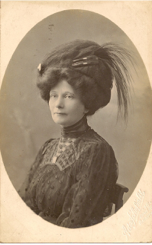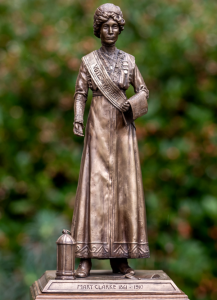A bestselling Brighton author has given his backing to the appeal to raise funds for a statue to commemorate the first suffragette to die for the cause.

Peter James has become a patron of the Mary Clarke Statue Appeal which aims to honour the Brighton-based martyr.
The 73-year-old crime writer has also donated £1,000 to the appeal which has won widespread community support including cross-party backing from members of Brighton and Hove City Council.
He said: “Mary Clarke was an extraordinary woman who fought tirelessly to support votes for women.
“She was a determined campaigner who never gave up and sadly became the first woman to die for such an important cause.
“This statue is such a significant recognition for all she set in motion, both for Brighton and for women’s rights throughout the world, and I am delighted to be supporting it.”
Mary Clarke worked in Brighton as the south coast organiser for the Women’s Social and Political Union.
The appeal said: “Despite her sacrifice, and the fact she was Emmeline Pankhurst’s sister, she has no public memorial anywhere in the country.”
Peter James is best known for his Roy Grace detective novels which have also become a popular television drama on ITV, starring John Simm, and been adapted for the stage.
He is also a patron of the Sussex Police Charitable Trust and has won more than 40 awards for his books which have sold more than 21 million copies.
Jean Calder, who chairs the appeal, said: “We are so grateful to Peter James for his support and his generosity. We are hoping this will encourage others to give.”
The appeal’s current target is £35,000, which it hopes to raise by the end of next year, with help from individual and corporate sponsors.
Donations to the appeal can be made via the website maryclarkestatue.com or directly to localgiving.org/charity/mary-clarke-statue-appeal or paypal.com/gb/fundraiser/charity/3881341.
Mary Clarke led the suffragette movement in Brighton and the south east from 1909 until her death on Christmas Day in 1910.

The appeal said that she was committed to non-violence but was injured on Friday 18 November 1910 – known as ‘Black Friday’ – when “300 women were systematically beaten and sexually assaulted outside Parliament”.
“She was imprisoned for a month, went on hunger strike and was forcibly fed,” the appeal said. “Released on (Friday) 23 December, she died on Christmas Day of a brain haemorrhage.
“It was a tragic loss of a woman who had devoted herself to work in Brighton and Hove and was admired and loved. Her memorial service was held in the Royal Pavilion.”
The appeal has asked the sculptor Denise Dutton to create the statue to remember Mary Clarke. And she has already completed a bronze maquette, or scale model, which was presented to the mayor of Brighton and Hove, Alan Robins, earlier this year.









